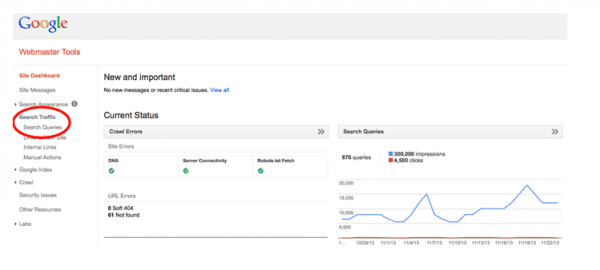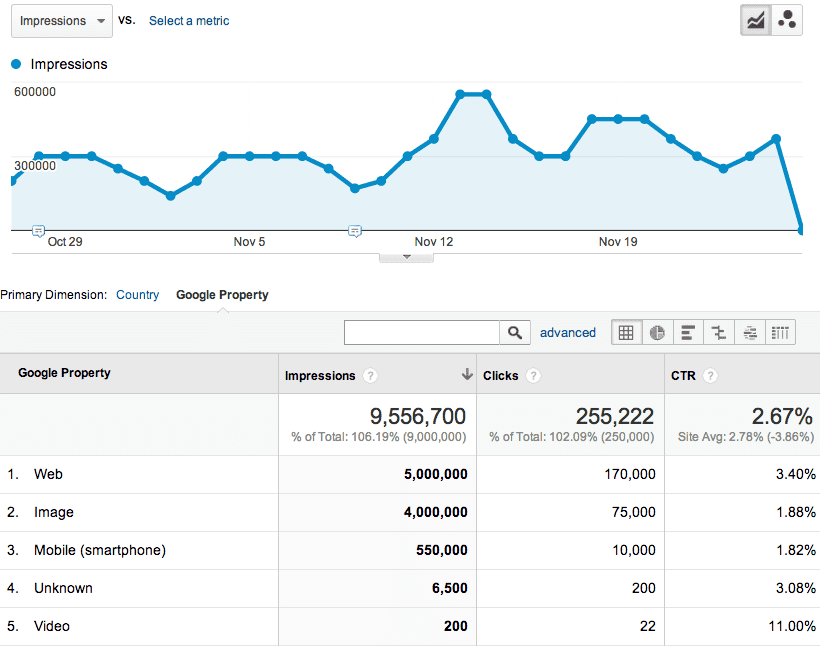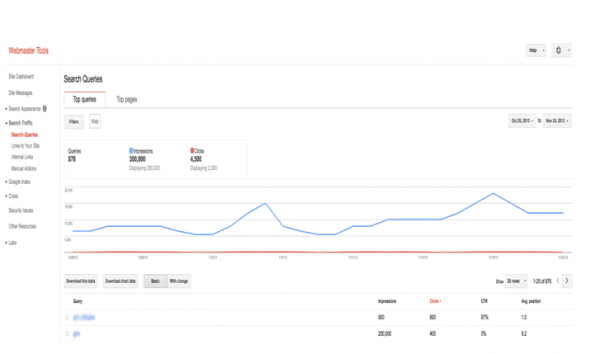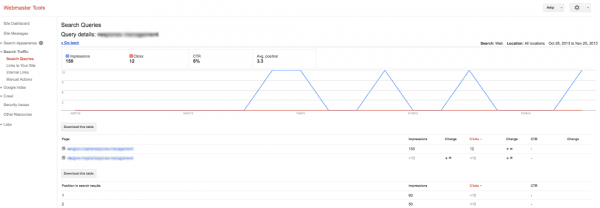A tutorial showing how to use the keyword insights now available from Google Search Console and Google Analytics
Earlier this Autumn, as shown in this Smart Insights alert, Google made the step that many SEOs and digital marketers were fearing: the encryption of all organic search traffic. The dreaded (Not Provided) had already been creeping up steadily, but now it's approaching 100% making it impossible to see in the original SEO reporting in analytics which keywords from Google are driving visits and converting.
May 2015 update: Google has now renamed Google Webmaster Tools to Search Console.
Whilst we can argue about the rights and wrongs of this change, it means that we can no longer access organic keyword-level data in our web analytics solutions, such as Google Analytics and Adobe Sitecatalyst. This data is extremely valuable to digital marketers, since it allows us to:
- Find opportunities to improve the performance or ranking of a particular page
- Identify what keywords are driving traffic to a website or page
- Demonstrate how an increase in SEO efforts have improved rankings
- Understand how searchers perceive our brand, content and website
- Unearth new keyword opportunities
So, where can we go to get hold of keyword-level data in order to continue working on some of the tasks listed above?
However there are a number of potential solutions and in this post, I'm going to focus on one of the options - the Google Webmaster Tools SEO data which is also available in Google Analytics if you enable integration between two accounts. Expert members of Smart Insights can also watch a video screencast by Dave Chaffey explaining this and 3 other SEO analysis and reporting tools.
Google Webmaster Tools
One of the solutions we can use to get hold of the remaining keyword-level data available to us is Google Webmaster Tools:
We can access this data by going to Search Traffic -> Search Queries or in Google Analytics see this support post from Google which explains how to set up integration with Google Webmaster Tools (GWT).

Limitations of Google Webmaster Tools SEO data
One thing to note up-front is that the keyword-level data available from Webmaster Tools is less accurate than anything we could ever get from Sitecatalyst or Google Analytics.
You need to be aware of these limitations and explain them to clients or colleagues when presenting your data:
- The data goes back to 90 days (expected to soon be extended to one year).
- You can only see the top 1,000 terms for a single day
- Google Analytics and Sitecatalyst originally use different sources of data (from the query string before secure search) compared to Webmaster Tools.
Nevertheless, Webmaster Tools is not as inaccurate or useless as some suggest and in a world where we have limited keyword-level data from elsewhere, I believe it’s important that we embrace what we can get from a free tool that and can provide some very valuable insights.
Plus, an added benefit is that you can now access Webmaster Tools search optimisation data directly from Google Analytics so that web data from Google can be consolidated in one play.
Setting up Google Analytics data to analyse the GWT data has additional benefits in that you can apply secondary dimensions for country where visits originated or different types of SEO traffic, e.g. from images or mobile as below.

What does the search queries report provide?

The search queries report provides a range of information that can be used to evaluate organic search performance and identify any specific areas that might need to be looked at further.
The main elements of the report include:
- Queries: The total number of search queries for which pages of your site was shown in organic search over a given period of time.
- Impressions: The number of times pages from your site appeared in search results.
- Clicks: The number of times a user clicked your site's listing in search results for a particular query.
- CTR: The percentage of impressions that resulted in a click to your site.
- Average position: The average top position of your site on the search results page for a given query.
- Top pages: This tab shows the top pages of your site appearing in organic search results.
As you can see, in addition to ‘Queries’, Webmaster Tools also provides extra insight in the form of CTR, impressions and average position data for each query, all of which can produce a more rounded view of performance.
As well as forming an understanding of what your audience is interested in, by looking at queries that also contains impression data, average ranking and CTR, when traffic falls you’ll be able to get a better idea as to whether this is due to ranking issues or seasonality.
With the lack of keyword-level data available from standard analytics tools, you can now start to make an assessment of what keywords are performing well for your site, what you would expect to see doing well and any anomalies that are standing out. This data can give you a baseline to measure performance and begin to set actions in place for optimisation.
Take some time to review the summary of the top performing queries as well as drill down into specific, individual keywords to get an idea of how you're performing for each term:

This data will provide insight into which pages are ranking for those terms and help you to further develop your content strategy.
For example, as well as assessing the performance of your existing content for targeted keywords, you can also identify other keywords with good potential that could be integrated into new content, such as articles, blog posts, videos or infographics.
Click through rate (CTR) can be really helpful for identifying where meta data could be improved.
For example, although a search term may be ranking quite highly, if the CTR is low this may indicate that the title tag, description or any additional structured data, e.g. Schema.org, could be tidied up and improved.
Although they are approximations, Google provides average positions for all the different keywords in the query report.
This offers some interesting data that can help you see how your keywords are performing and their impact on traffic.
Average position can also be used to track rankings over time. As you put more effort into optimising the content and structure of your website, you can monitor ranking fluctuations month-on-month to assess your SEO efforts.
The ‘Top pages’ report allows you to evaluate which content and pages across your site are getting the most impressions and clicks and enables you to look for new opportunities for improvement:

For example, the data in this report may indicate that there are pages within your site that are ranking on page 2 or lower and yet receive a large amount of impressions or have a good CTR.
Using this insight, you can adjust your SEO strategy and optimise these pages to help improve their performance within the SERPs.
Assess performance over time
Use the ‘with change’ feature to track your performance over time:

This feature is useful if you want to assess your SEO efforts, especially after the launch of a new product or piece of content to see if your updates are effective, or even to track how search engine algorithm updates or changes may be impacting your average rankings and conversions.
Summary
With the 100% encryption of keyword-level data in our web analytics solutions, it’s important that we look for other opportunities to retrieve whatever keyword data we can in order to improve our content and SEO efforts.
Whilst the data available from Google Webmaster Tools may not be as accurate or helpful as that we could previously derive from Google Analytics, the tools does provide a wide range of interesting and very useful insights to help us assess how our sites are performing and the actions we can take to make further improvements.












